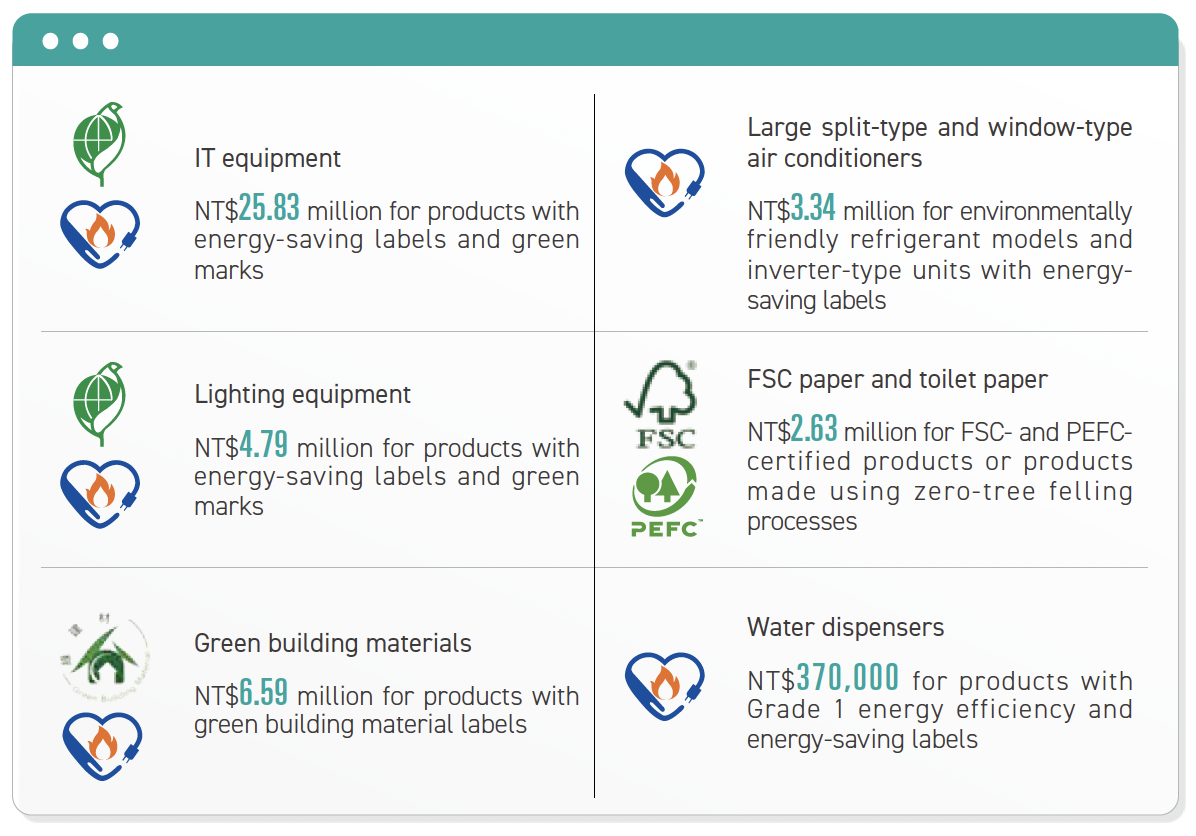The main suppliers of TCFHC Group are IT equipment and system manufacturers. In order to actively respond to the government’s green procurement policy and deeply embed the concept of sustainability in procurement operations, the Group implements supplier sustainability management and collaborates with suppliers to jointly practice environmental sustainability.
Supplier Management
TCFHC continues to promote its Supplier Management Policy . Since 2020, TCFHC has required suppliers with individual procurement amounts exceeding NT$1 million to sign a Supplier Corporate Social Responsibility and Environmental Sustainability Commitment Letter. In addition, procurement contracts include clauses related to corporate social responsibility, clearly stating that suppliers must comply with regulations on occupational health and safety, environmental protection, and ethical conduct. With regard to labor and human rights, the policy mandates that suppliers comply with national labor laws, including the Labor Standards Act provisions (such as working hours, wage payment, paid leave, and equal pay for equal work). These requirements aim to protect workers’ rights, strengthen labor-employer relations, and contribute to social and economic development. Suppliers are also required to follow relevant procedures and advance notice provisions under the Mass Redundancy Protection Act, to prevent infringement or potential infringement of labor rights due to large-scale layoffs, thereby supporting social stability. In 2024, a total of 458 suppliers with individual procurement amounts over NT$1 million signed the commitment letter.
Supplier Management Policy

Suppliers’ Human Rights Due Diligence
In order to implement the Supplier Management Policy, suppliers are urged to comply with relevant labor regulations and adhere to international human rights conventions. Potential and possible human rights issues are identified and compiled, and regular human rights due diligence is conducted for suppliers, including avoiding or reducing overtime or excessive working hours, setting maximum working hours and equal remuneration for men and women etc., to assess the frequency and severity of potential risks. Mitigation measures are developed for potential human rights risks to serve as a reference for future improvements to the Supplier Management Policy.
Supplier Human Rights Due Diligence Results and Responsive Measures
In 2024, TCFHC's human rights due diligence focused on 5 key risk categories, which were workplace diversity, gender equality, maternal health protection, forced labor, and occupational health and safety. A total of 26 potential human rights risk issues were identified. The assessment targeted suppliers (contractors) with annual transaction amounts exceeding NT$1 million, achieving a 100% response rate. Overall, the results indicated a low level of risk exposure. For the 3 human rights risk issues with relatively higher exposure identified through the self-assessment, TCFHC has formulated corresponding response measures as follows:

Supply Chain Empowerment
Promoting ESG Implementation among Suppliers
To collaborate with suppliers in promoting ESG and achieving sustainable development goals, TCB has established the "Supplier ESG Incentive Guidelines." These guidelines include incentive measures such as reducing performance bond and warranty deposit requirements, public recognition, and inviting suppliers to participate in ESG training and workshops. Through supplier self-assessments and on-site audits, the Bank evaluates suppliers’ ESG practices and encourages them to prioritize and implement environmental sustainability, corporate social responsibility, and corporate governance. In 2024, ESG self-assessments were completed by 85 suppliers, and 16 suppliers underwent on-site ESG evaluations. These efforts aim to continually motivate and urge suppliers to uphold ESG principles and to implement ethical business practices.
Supplier Management Conference
To harness the influence of financial institutions and collaborate with suppliers and borrowers in achieving the 2050 net-zero transition, TCFHC hosted the “4 th Joint State-Owned Financial Institutions Supplier Conference” in September 2024. With the theme “Carbon Emissions Have a Price—Reduce Emissions, Achieve Net Zero”, the event brought together officials from the Ministry of Finance, Ministry of Environment, and Financial Supervisory Commission’s Banking Bureau, as well as chiefs of 9 state-owned banks. More than 200 suppliers and borrowers participated in the event, which focused on Taiwan’s carbon fee policy, the impact of carbon pricing on businesses, and response strategies for suppliers.
In line with the conference theme and the goal of reducing carbon emissions and achieving net zero, all aspects of the event planning, including registration, venue setup, and refreshments, were carried out using environmentally friendly or reusable materials. The estimated carbon reduction totaled approximately 4,071 kg CO 2 e, equivalent to the amount of carbon absorbed in one day by 3.84 Daan Forest Park.
Green Procurement
In order to practice green procurement and implement environmental protection, TCFHC prioritizes the use of environmentally friendly products with environmental protection labels, energy-saving labels, water-saving labels, and sustainable forestry labels. In line with the principle of “green operations and environmental friendliness”, office renovation projects are carried out using green building materials. In 2024, the amount of green procurement reached NT$95.74 million. In addition, TCB was recognized by the Taipei City Government’s Department of Environmental Protection under the “Promoting Green Procurement Plan for Private Enterprises and Groups” for outstanding performance for 5 consecutive years.

Sustainable Procurement
In order to comply with the international sustainability trend, TCFHC has clearly formulated a “Sustainable Procurement Policy” to follow, implementing the sustainability concept in the procurement units of each company in the Group and extending it to partner suppliers. In addition, TCB was the 1st to adopt the “ISO 20400 Sustainable Procurement - Guidance” in April 2022, passing the audit conducted by BSI. TCFHC and all other subsidiaries also passed the BSI audit in January 2023.
